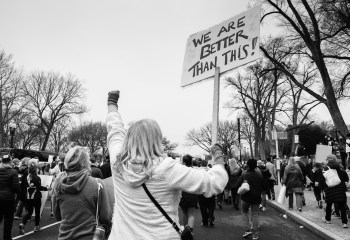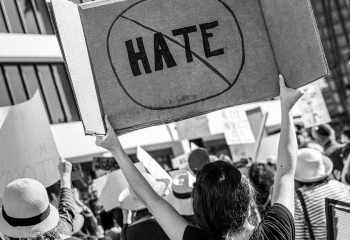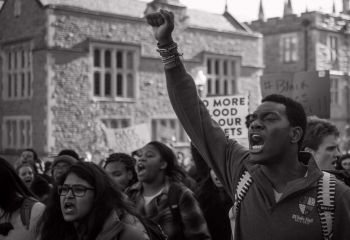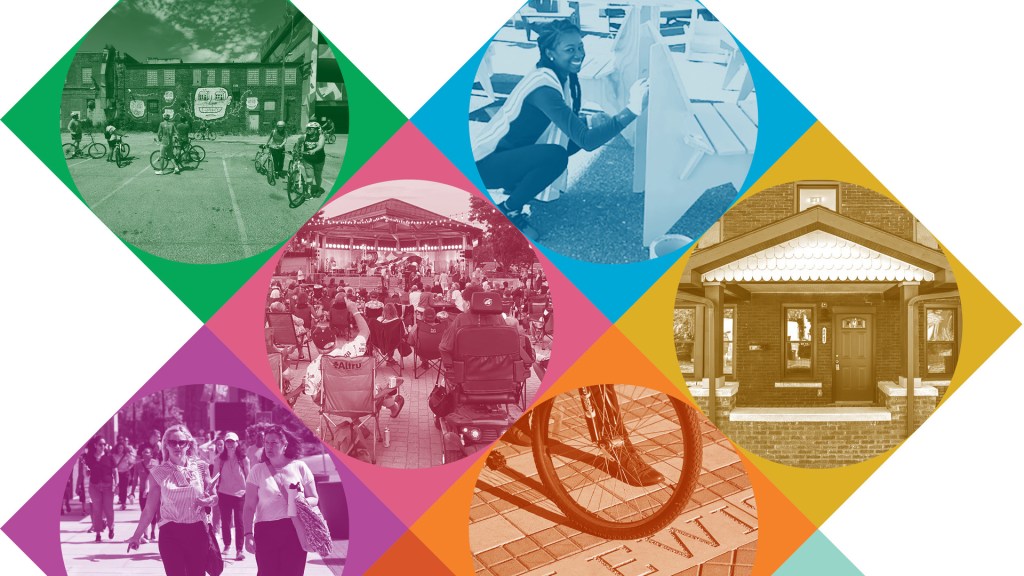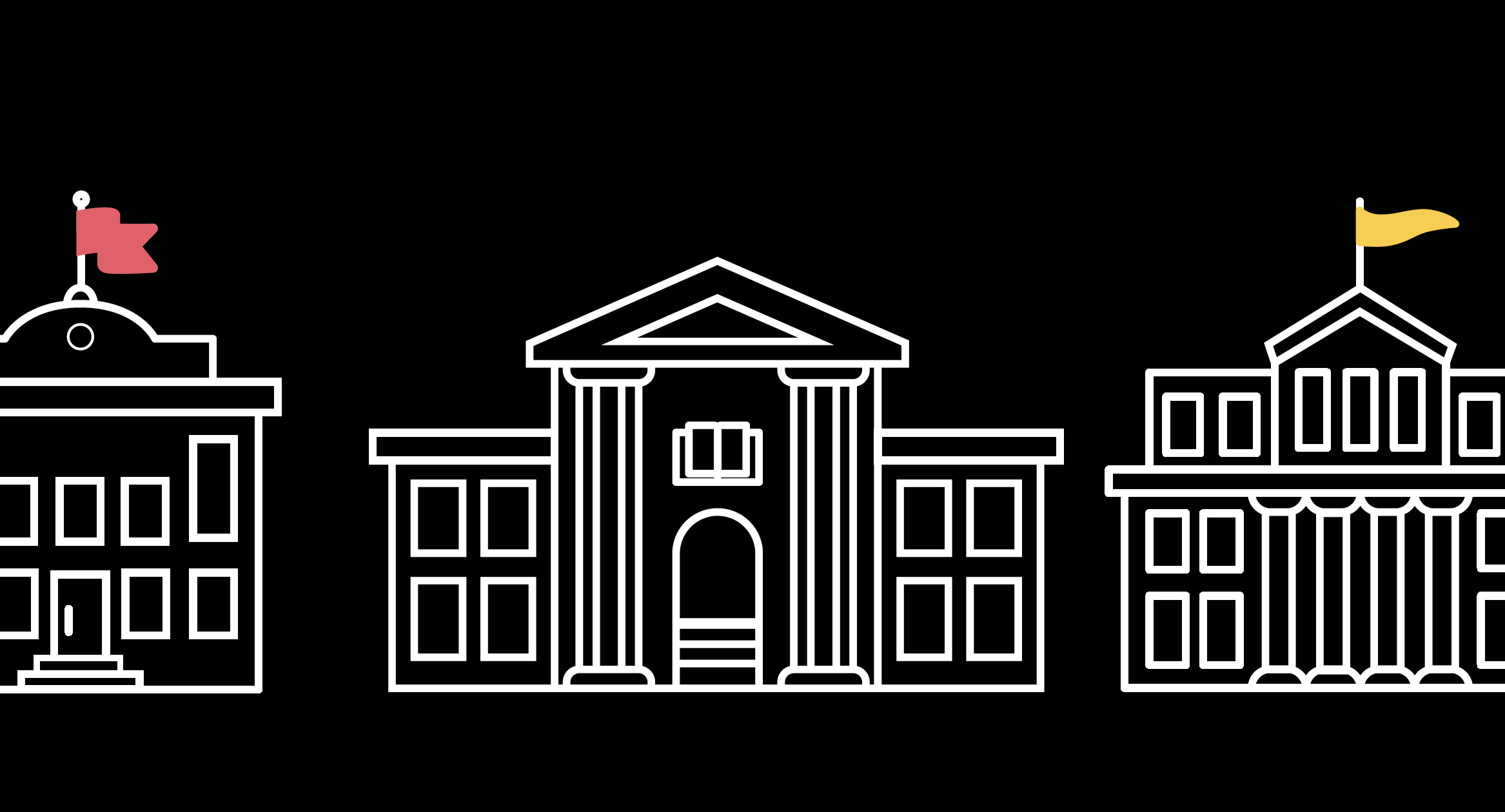
Campus Speech 2020: New survey reveals college student views on free speech and inclusivity
On May 5, 2020, Gallup and Knight Foundation released a new report on college students and their attitudes about Free Speech. Knight’s Evette Alexander shares insights below. View the full report and additional insights here.
For some time now, the practice of free speech on college campuses has been challenged by America’s increasingly complex social and political fabric — particularly heading into a hotly contested presidential election year. Yet, as the primary season began to unfold, so did a global pandemic that dramatically altered the college experience for millions of students whose classroom discussions and campus chats moved strictly online. Only time will tell whether and when there will be a return to normalcy on campus, yet the views of young people on free expression are likely to influence how we regard the First Amendment and the rights it enshrines in the U.S. for decades to come.
A recently released Gallup-Knight Foundation study, “First Amendment on Campus 2020 Report: College Students’ Views of Free Expression,” reveals underlying attitudes toward free expression that are likely to inform our post-pandemic future. This survey of over 3,000 full-time U.S. college students was conducted in late 2019 as the latest in a series of similar studies in 2016 and 2017. This survey provides deep insights into the next generation’s attitudes toward free speech and expression at a time of rapid technological and political change — an understanding of which will be critical for policymakers, business leaders, academics and members of the media seeking to understand our shared democratic future.
This latest campus free speech study finds that among today’s college students, certain critical trends continue to hold or deepen as students struggle to reconcile the important but sometimes competing notions of free speech on one hand, and inclusivity on the other. Some of the key findings include:
Students want campus to be a place where they are exposed to all types of speech, even if it’s offensive — but also favor designated safe spaces and restrictions on speech that explicitly targets race or ethnicity. Eighty-one percent of students say they want a campus environment where students are exposed to all types of speech, even if they may find it offensive or biased, rather than being protected from it. At the same time, 78% are in favor of designated “safe spaces” on campus designed to be free of threatening actions, ideas or conversations. Growing majorities of college students believe colleges should be able to restrict the use of racial slurs (78%, up from 69% in 2016) and costumes that stereotype certain racial or ethnic groups (71%, up from 63% in 2016).
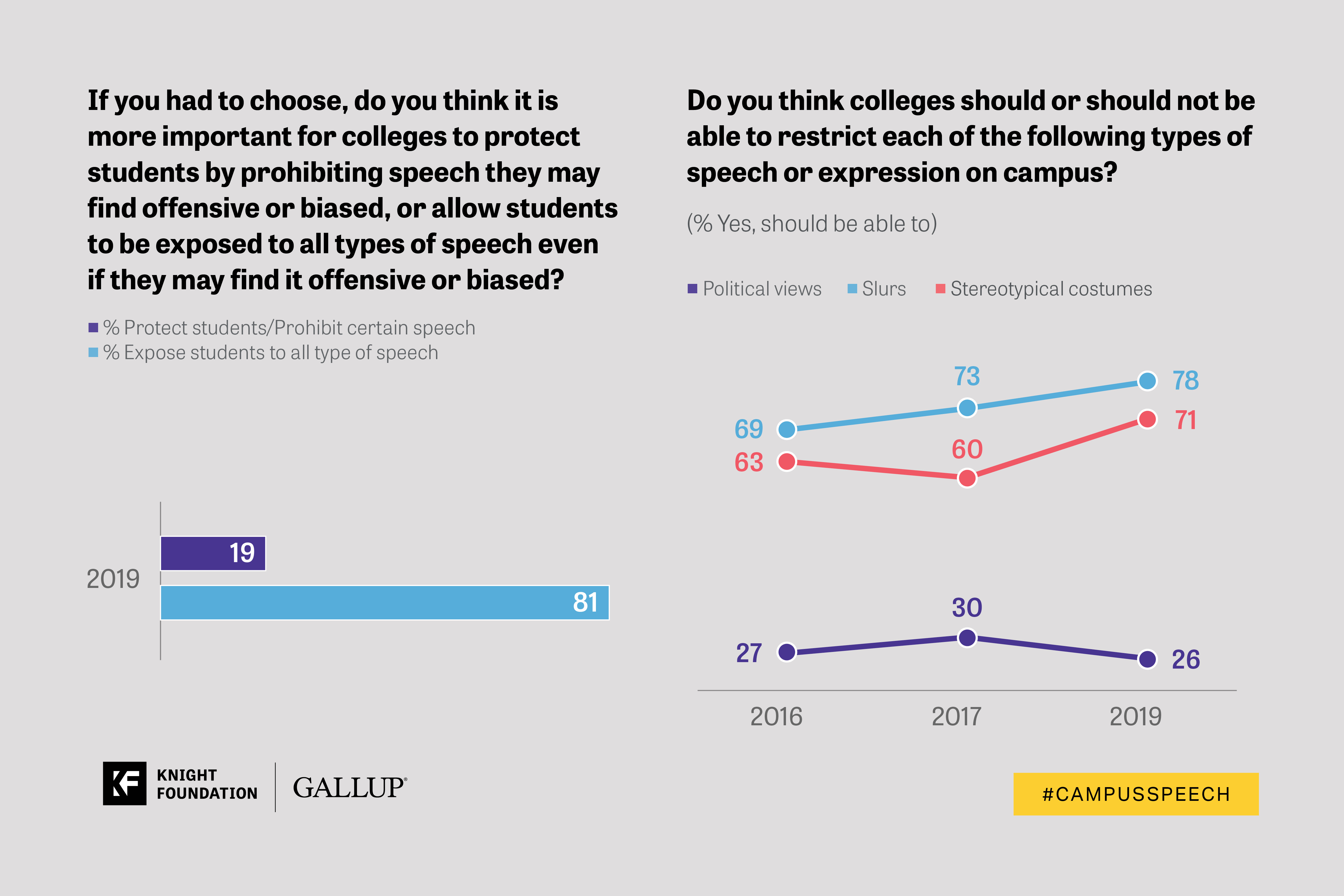
Students see free speech and an inclusive society that is welcoming to all groups as being equally important to democracy; however, many say these values are often in tension. A majority of students (68%) regard citizens’ free speech rights as being extremely important to democracy, while 69% believe an inclusive society that is welcoming to diverse groups is extremely important. Most college students of all demographics and political affiliations believe efforts at diversity and inclusion come into conflict with free speech rights at least occasionally, if not frequently.
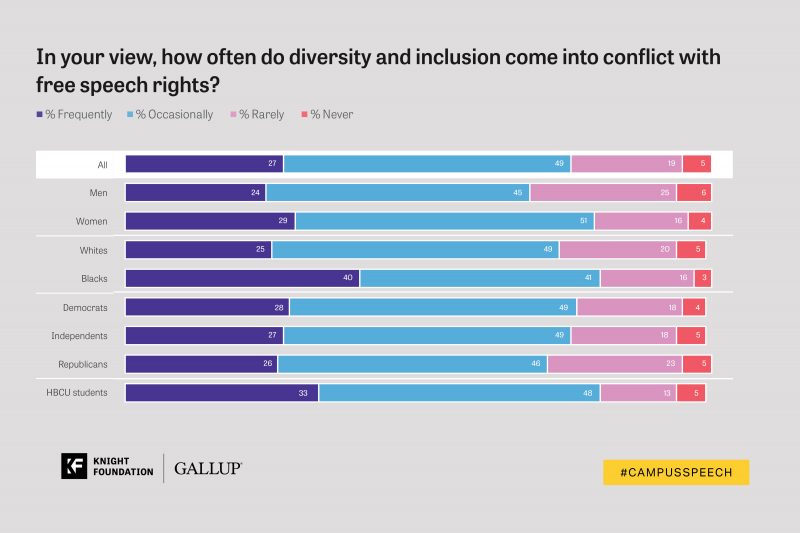
Wide racial and gender gaps exist in the extent to which students feel the First Amendment protects them. Nearly nine in 10 college students agree that the First Amendment protects people like themselves, including 44% who strongly agree. White students were more than twice as likely as black students to strongly agree, at 53% versus 25%, respectively. A majority of men (55%) strongly agreed, versus 39% of women.
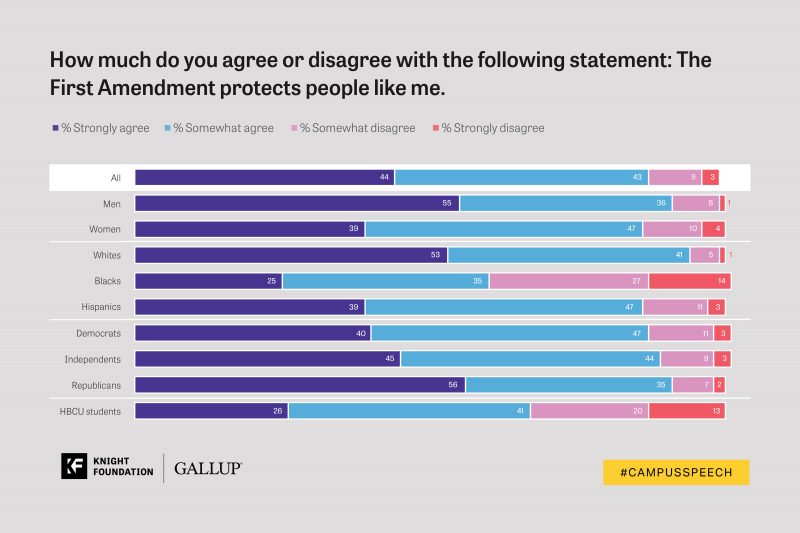
A growing number of students report having felt uncomfortable because of comments made on campus, mainly targeting their race or gender, and one in eight have felt unsafe. An increasing proportion of students — 38%, up from 25% in 2017 — say they have personally felt uncomfortable because of something someone said on campus. Just over half of students who have felt uncomfortable on campus say the comments referenced their race (52%) and another 43% (mostly women) said the remarks referred to their gender. One in eight students report that something they have heard on campus has left them feeling unsafe.
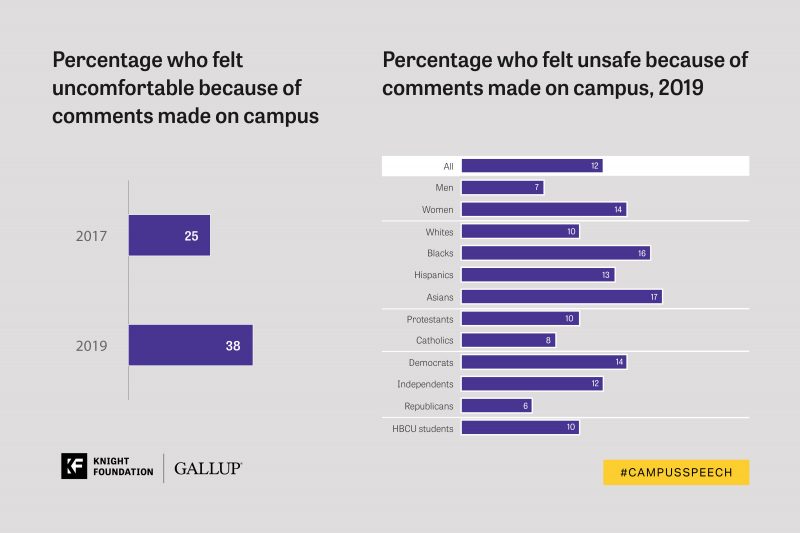
Students see free speech as increasingly less secure since 2016, and rank it as the least secure of all First Amendment freedoms in 2019. Fifty-nine percent of college students believe free speech rights are secure, down from 73% in 2016 and 64% in 2017. While 81% said free press rights were secure in 2016, that number has dropped significantly since.
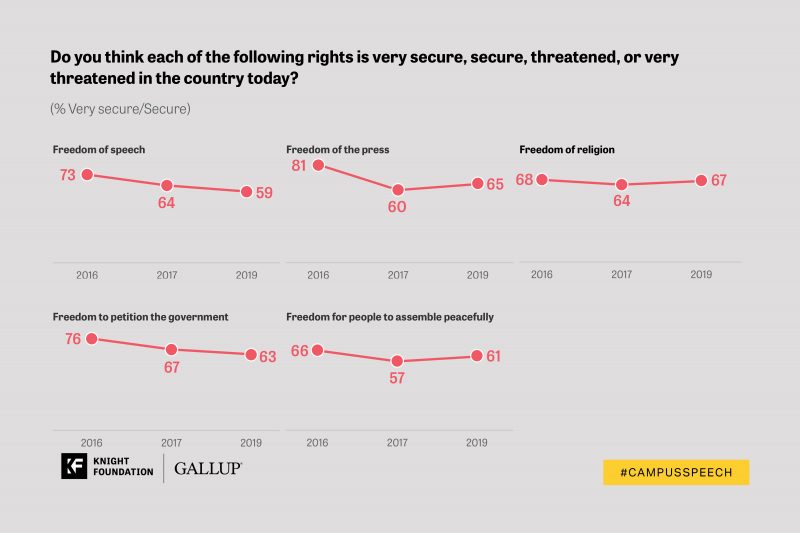
Students regard social media as the central forum for speech, but say the discourse online has fast deteriorated since 2016. Students say discussion of ideas at their college is more likely to take place on social media than face-to-face on campus. Far fewer students now (29%) than in 2016 (41%) say discussion on social media is usually civil. A growing number also agree that social media can stifle free speech — both because people block those whose views they disagree with (60%, up from 48% in 2016), and because people are afraid of being attacked or shamed by those who disagree with them online (58%, up from 49% in 2016).
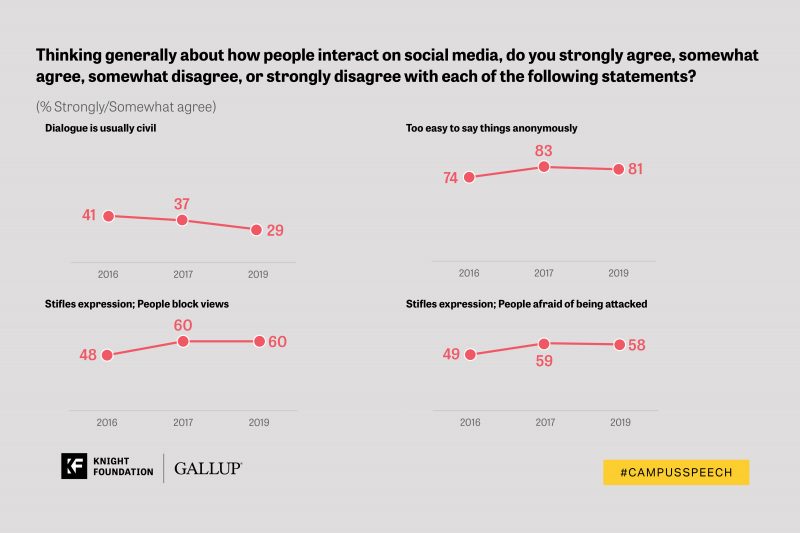
The Gallup-Knight report findings suggest that students embrace the idea of open inquiry on campus and see the value of exposure to all kinds of political speech, but they also want to make campuses and classrooms more inclusive. There are clear racial and gender differences when it comes to an appetite for speech protection, underpinned by differences in these groups’ experiences of speech on campus and in underlying perceptions that the First Amendment ultimately serves to protect people like them.
Knight has taken a deep interest in student attitudes toward free expression because ensuring a healthy democracy is our core value. These findings aren’t just about higher ed. They point to trends that are likely to reshape how freedom of expression is defined as this rising generation comes of age.
Evette Alexander is a director of learning and impact at Knight Foundation. You can follow her on Twitter at @evettewashere.
You may also be interested in…
Recent Content
-
Information and Societyarticle ·
-
Artsarticle ·
-
Information and Societyarticle ·


